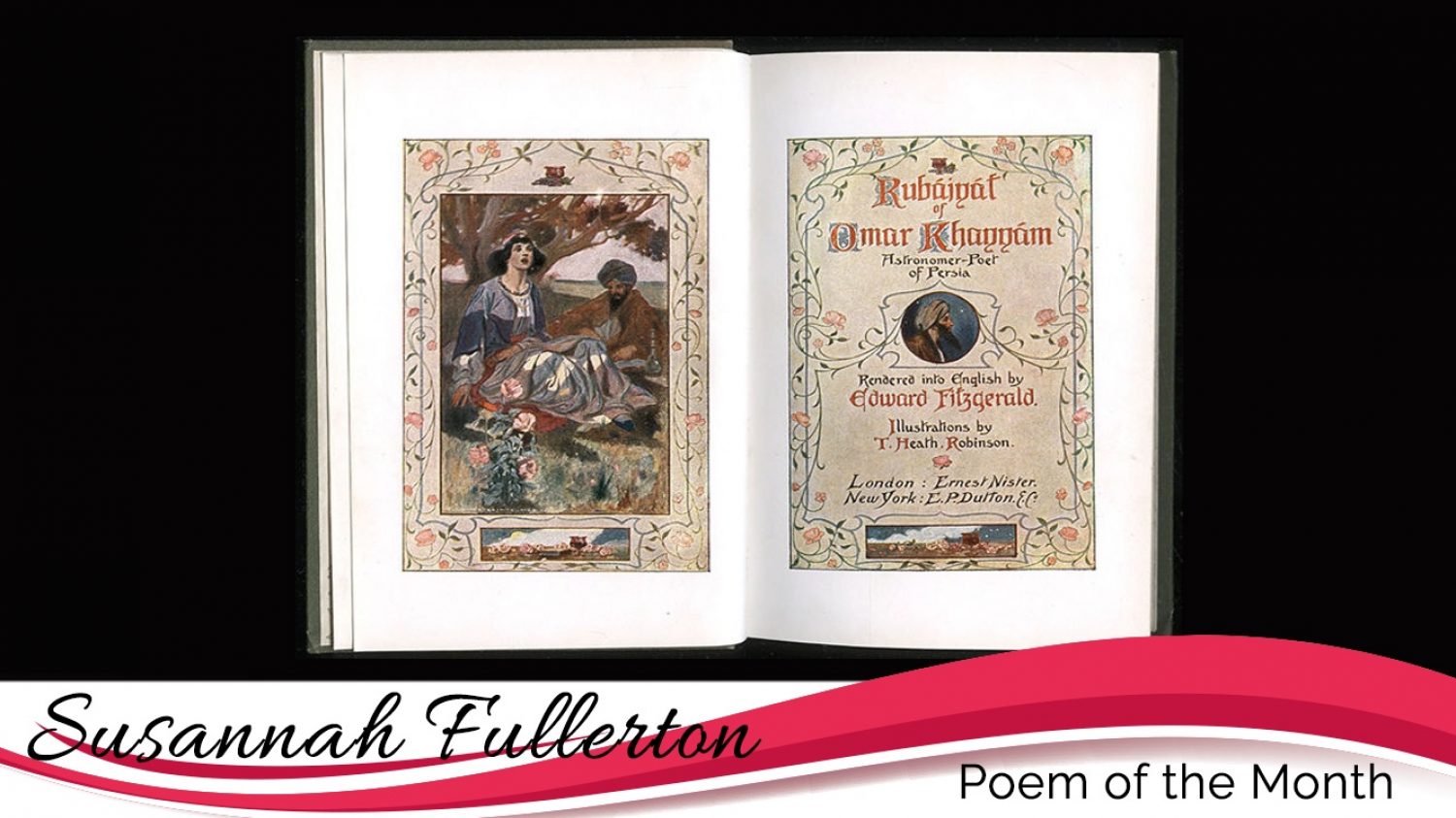Omar Khayyam was a Persian poet, born in the late 11th century. From what little we know, he must have been a remarkable man – an astronomer, mathematician, an author of a work exploring the connection between music and mathematics, a philosopher, and a poet. His ‘nickname’ was ‘King of the Wise’. The poetry attributed to him (and its authenticity is uncertain) consists of a series of quatrains.
In 1700 these were brought to the attention of Westerners, but it was Edward Fitzgerald’s beautiful translation of 1859 which really made the name of Omar Khayyam famed in the western world. This translation resulted in the formation of Omar Khayyam Clubs, Pre-Raphaelite artists illustrating some of its scenes, and many translations into other languages.
Edward Fitzgerald was the one who gave the verses the title The Rubaiyat of Omar Khayyam. His translation is rhyming and rather free, with some of his lines not actually traceable to the original source. Fitzgerald was honest about this, and there are sometimes different translations by him of the same verse. You’ll need to look up all the information about sources, accuracy, etc for yourselves as there’s too much information to include here, but I just love Fitzgerald’s Rubaiyat for itself, regardless of what inspired it.
I own a gorgeous little copy, with gilt edges, with lovely illustrations by T. Heath Robinson. I found it in an Auckland bookshop when I was 16, and have treasured it ever since. The poem is too long for me to give you all the verses here, but let me just share some favourites.
The Rubaiyat of Omar Khayyam
I
Awake! for Morning in the Bowl of Night
Has flung the Stone that puts the Stars to Flight:
And Lo! the Hunter of the East has caught
The Sultan’s Turret in a Noose of Light.
VII
Come, fill the Cup, and in the Fire of Spring
The Winter Garment of Repentance fling:
The Bird of Time has but a little way
To fly — and Lo! the Bird is on the Wing.
XI
Here with a Loaf of Bread beneath the Bough,
A Flask of Wine, a Book o Verse – and Thou
Beside me singing in the Wilderness –
And Wilderness is Paradise enow.
XVI
Think, in this batter’d caravanserai
Whose Doorways are alternate Night and Day,
How Sultan after Sultan with his Pomp
Abode his hour or two, and went his way.
XVII
I sometimes think that never blows so red
The Rose as where some buried Caesar bled;
That every Hyacinth the Garden wears
Dropt in its lap from some once lovely Head.
XXVII
Myself when young did eagerly frequent
Doctor and Saint, and heard great Argument
About it and about: but evermore
Came out by the same Door as in I went.
LI
The Moving Finger writes; and, having writ,
Moves on: nor all thy Piety and Wit
Shall lure it back to cancel half a Line,
Nor all thy Tears wash out a Word of it.
LXXV
And when Thyself with shining Foot shall pass
Among the Guests Star-scatter’d on the Grass,
And in thy joyous Errand reach the Spot
Where I made one, turn down an empty Glass.
These verses are my favourites and the ones I go back to most often. You possibly have your own preferred lines. But I hope that this might inspire you to find the poem and read it. Take Omar’s advice to have a “flask of wine” and “Book o verse” and find peace and happiness in this marvellous poem.
You can listen to it being read:
Have you enjoyed this excerpt? Have you read it all? Or listened to it recited here? Share your thoughts by leaving a comment.
Selected links for relevant websites, books, movies, videos, and more. Some of these links lead to protected content on this website, learn more about that here.


Carol Dawson
I can’t believe no one has made a comment, my father had a copy of the Rubaiyat that he carried throughout his war years, an Airforce man in Signals, early in his years dad was a telegraph boy, he told me that he once delivered a telegram (remember those?)sent to a bride that read;
There was a Door to which I found no Key:
There was a Veil past which I could not see:
Some little Talk awhile of Me and THEE
There seem’d -and then no more of THEE and ME.
We had some fun thinking of what the message really meant and did the Best Man read it out. my father gave me his copy when I was about 14 which is a long time ago. One of my favourite verses is:
Ah, Love! could thou and I with Fate conspire
To grasp this sorry Scheme of Things entire,
Would not we shatter it to bits-and then
Re-mold it nearer to the Heart’s Desire!
Fitzgerald is by far the best translation, his translation has a lyric none of the others do.
Susannah Fullerton
Thank you, thank you, thank you for sharing my love for this wonderful poem, and your favourite verse is just divine! I did enjoy the wedding story – thanks for sharing that. I agree that Fitzgerald’s translation is definitely the best.
And now for a book of verse and a jug of wine ….